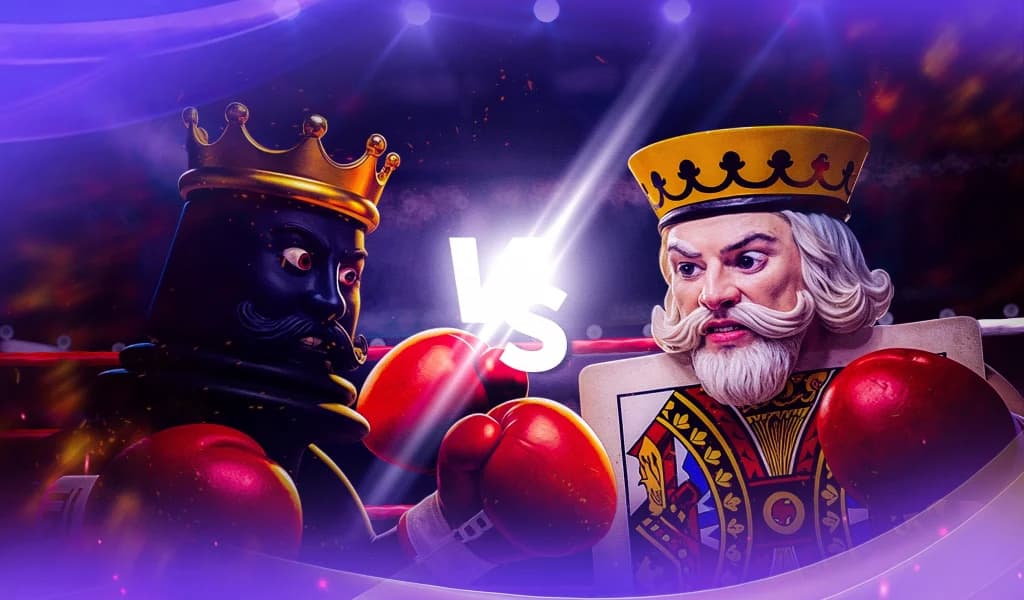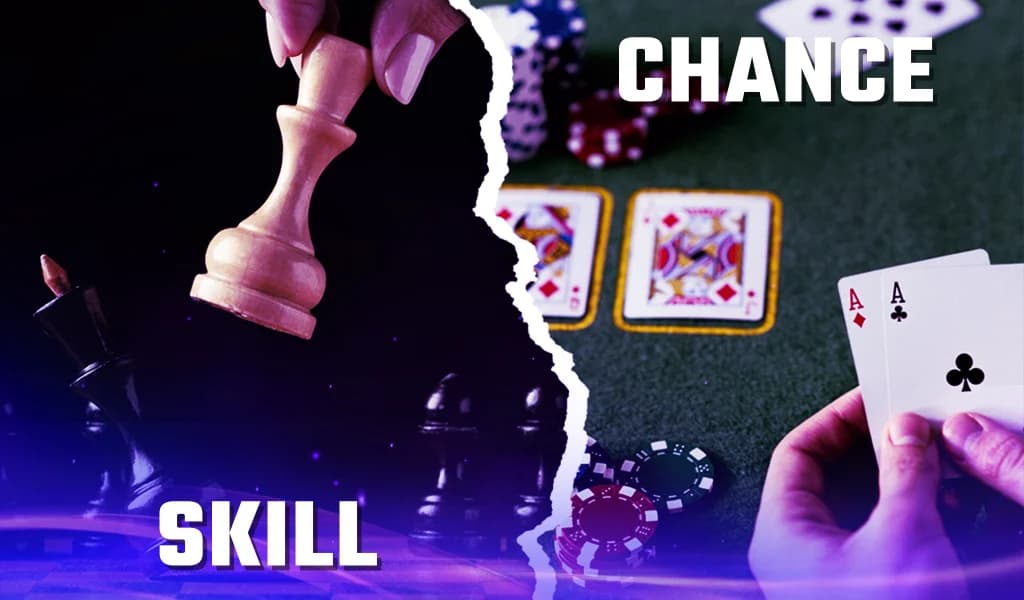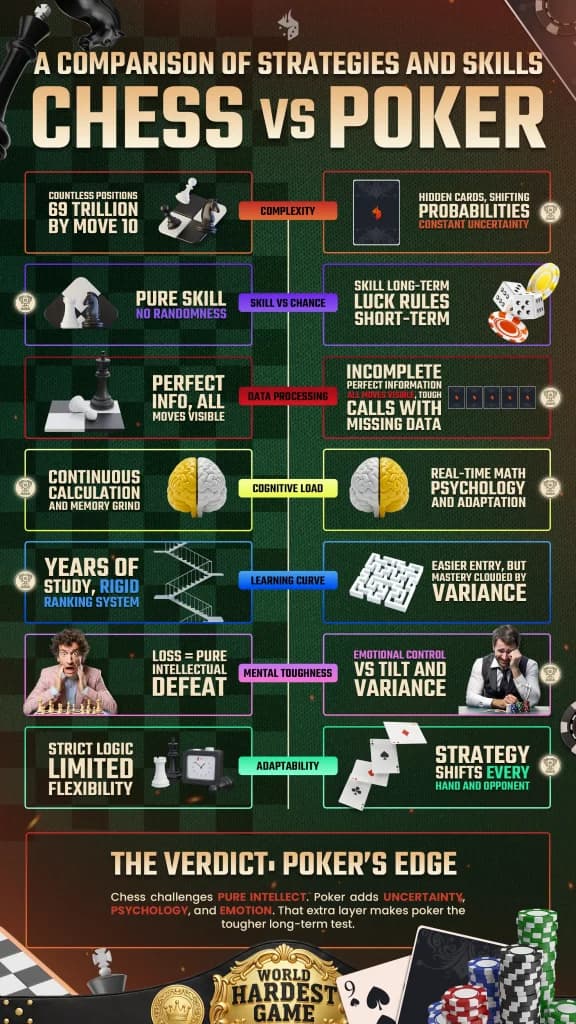
Chess and poker attract a lot of the same types of players. They bring in people who are cerebral, competitive, and love to test themselves against skilled competition.
For chess, there’s a deep library of strategies and tactics to learn, and the journey to mastery can be incredibly satisfying. Players are rewarded for their efforts by watching their Elo rating increase one game after the other. It’s a grind, but working through each match hones your skill until you can outplay a new opponent without too much effort.
In poker, the rewards are financial. Players who use winning strategies against their opponents can enjoy the immediate gratification of scooping a big pot or taking home the top prize in a tournament. The journey is somewhat similar to chess. Players with thousands of hours in the game accumulate a number of advantages and can usually (although not always) handle a newcomer pretty easily.
But which game is truly harder? Resolving that question requires a head-to-head evaluation of a number of factors.
Complexity
Just 10 moves into a chess game, there are 69 trillion possible positions players could see. The complexity of the game is extraordinary. But nothing is hidden except for the motives of your opponent. All the pieces are visible. There is no uncertainty as to where a piece might be.
Poker is different. Here, the complexity comes not just from the random shuffle of the deck of cards, but also from the fact that your opponent’s cards are hidden. Their behaviors often reveal something about their hand, but sometimes, the same behaviors actually conceal something about their hand. Is that a bet from strength, or from weakness? Does your opponent want you to fear them, or to be lured in?
Skill vs Chance
Chess is a game that is pure skill. The end result is based entirely on player decisions. Typically, the better player is going to win. There are very few exceptions, unless someone makes an unexpected blunder.
Poker has a significant luck element. Skill is still the long-term determinant of success, but short-term volatility can be very high. An amateur can beat a pro sometimes. This pretty much can’t happen in chess. But in poker, a player can make the right decision but still lose in the short term due to variance. It can be maddening sometimes that skill isn’t the only element at play in the game.
Chess is a purer test of ability, and so wins in this category.

Data Processing
Which game is harder from a data processing standpoint? Chess is a game where there is too much information to analyze. Famously, chess is not a “solved” game. You cannot get to a particular spot and reach a guaranteed win using a computer. There are just too many moves to calculate. However, computers have long outpaced human minds in chess, and regularly dominate even the world’s top players. There is total transparency, though. All pieces are visible. Players must win while their opponents can see exactly what they’re doing.
Poker, on the other hand, is impenetrable. The fog of uncertainty makes poker a very hard game to process. To make a good tactical decision, a player has to analyze not just cards, but also probability and human psychology. Players must also make their decisions with pieces of the puzzle missing. They have to consider ranges and bets that can be of any size, possibly for a large number of opponents.
Imagine if chess was played on a 9-way board with pieces missing from view. That’s poker.
Cognitive Load
Which game puts more strain on the brain? Chess requires consideration of deep strategy, challenging players to maintain sharp focus and perform at a near-perfect level. One mistake could cause a whole game to unravel.
Poker is a bit different. It demands rapid, real-time probability calculation and problem solving. Players may need to switch up fast. The environment is fluid and chaotic. And the game can go on for hours and days.
This category is essentially a tie between the two games. Both really put players to the test and are truly mentally exhausting.

Learning Curve
Which game is a tougher journey to mastery?
Chess takes thousands of hours of study if a player wants to become seriously competitive. And it is nearly impossible impossible without a very high level of intelligence. At the top levels, chess attracts some of the most analytical minds in the world. But reliably, if a player is willing to put in the time to learn openings, midgame principles, and how to close out a win, they can steadily get better over time.
Poker is also quite hard to master, but it is just not on the same level as chess. A new player can fairly quickly get their legs under them and begin competing and winning. The luck element makes it possible for players to even win big in the early phase of their competition career. This just isn’t possible with chess. Strong chess players act as gatekeepers before a player even cracks a FIDE score of 1,000. Mastery will take players of either game decades, but chess has a much steeper learning curve.
Mental Toughness
Which game tests players’ mental toughness more? While a chess loss is an intellectual defeat, poker famously challenges emotions. It’s not that chess can’t make players angry, but poker does it nearly every hand. The risk of tilt, even after one upsetting bad beat or mistake, is always there. Poker players need to learn to control their anger and stand up from the table as often as they need to. Other players are also allowed to seriously mess with each other, trying to push buttons to gain an advantage. They can be chatty in a live game, throwing out banter and verbal barbs to knock opponents off their game.
Chess requires total focus, but poker demands more mental toughness and a more diverse set of emotional management techniques.
Adaptability
Which game makes you adapt more? Chess requires preparation, and different strategies will be better for different games. But as the pieces move, however, there is often a single best move and line toward setting up an unbreakable advantage. You play the board, not really the person. While some players prefer aggression and boldness to steady, conservative play, it is not usually required to radically reframe strategy midgame.
In comparison, poker is constantly in flux. Many opponents are coming and going at all times, especially in online poker. Emotional states are constantly changing. Fortunes are always shifting, and stacks rise and fall. In one hand, you may play the bully and win. Then, you might have to back up a bit and weather the storm as the table plays back at you. While a loose player is seated to your right, you might be playing a wide variety of hands. When that same player gets cleaned out, you might have to quickly tighten up. Poker requires constant adaptation and real-time awareness of the state of the table and the opponents you find there.
So, which is harder – chess or poker?
For pure brilliance, chess may be king. Is there any activity that is as pure a test of mental strategic skill as chess? The players at the very top of the game are nearly untouchable, and it becomes worldwide news when someone like Magnus Carlsen loses even a single game.
But in poker, it is undeniably impressive when a player guts out a World Series of Poker win. They outlast a field of thousands over the course of grueling days of play, winning millions for taking the top spot. Players reaching that pinnacle have not only displayed incredible strategic capability but also an understanding of psychology, statistics, and more. And undoubtedly, even the best need some luck along the way.
Could a master of one reach the same success in the other? It’s quite clear that both attract intellectuals, but perhaps different kinds. Ultimately, however, poker requires a more versatile set of high-level skills and can thus be thought of as the harder game.



